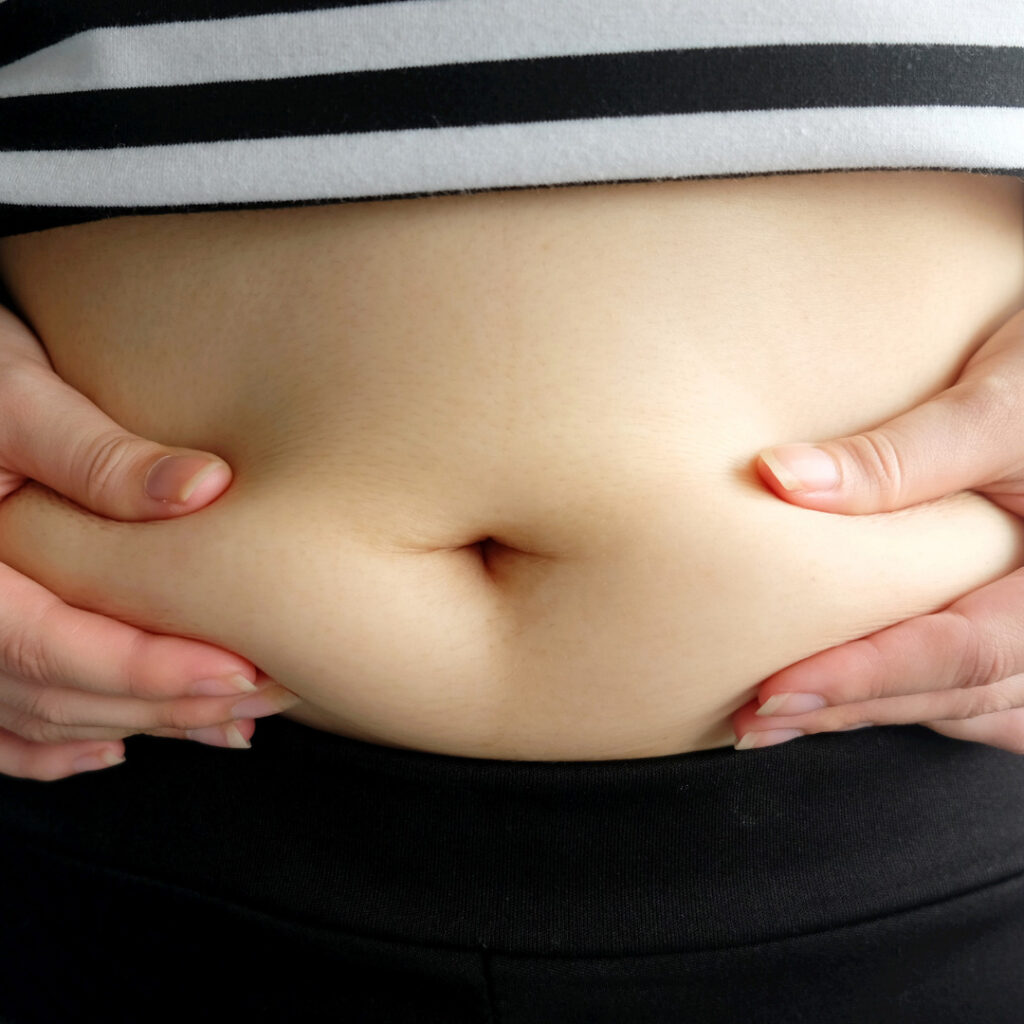Losing Your Meno 10 – Menopause Weight Loss Tips

You may have heard of the “freshman 15”, but what about the “meno 10”? Both terms are used to describe unwanted but very common weight gain during the corresponding phases of life (the first year of college and the season of menopause, respectively). This article discusses the relationship between weight gain and menopause and offers some ideas for managing your extra weight.
Why Is Weight Gain Common During Menopause?
As with many facets of menopause, the meno 10 appears to be somewhat associated with the natural fluctuations in your estrogen levels during midlife.
However, the biggest reason women gain weight during midlife is simply due to the fact that we gain weight more easily (without even trying!) as we get older. This is partly because of a slowed metabolism, loss of muscle mass, increased insulin resistance, and disruption in sleep cycle. Many women start gaining their meno 10 during perimenopause, which can begin a decade before menopause. Ah, the joys of aging.
What’s even more interesting is that there appears to be a link between menopause and where women typically gain the meno 10. Weight gain is most common in the abdomen and is called central body fat. What we women refer to as “belly fat,” the extra weight that sits right around our stomach.
Central body fat is associated with an increased risk for metabolic disturbances in blood sugar and blood pressure, as well as cardiovascular disease, the leading cause of death in postmenopausal women.
Furthermore, weight gain during midlife is associated with an increased risk for cancer, arthritis, mood disorders, and sexual dysfunction. Obese women tend to experience more severe and frequent menopausal symptoms, such as hot flashes.
Can You Prevent or Stop Weight Gain During Menopause?
On average, women gain 1.5 pounds each year during their 50s and 60s, regardless of initial body weight or race/ethnicity. The best way to prevent and manage weight gain during menopause is to establish healthy lifestyle habits as much as possible. Earlier in life is better, but you can lose weight and improve your health at any age.
Eating well and exercising regularly are important factors in overall health throughout life, and menopause is no different. Additionally, becoming aware of other factors that may be contributing to the meno 10 is a good idea. For example, disrupted sleep and high levels of stress are known contributors to weight gain. If you notice either of these patterns in your life, it’s a good idea to speak to your healthcare professional and take steps to change your lifestyle.
Can Other Health Conditions Cause Weight Gain During Menopause?
Sometimes, it’s not just the natural aging process that promotes the meno 10.
Many women struggle with conditions like underactive thyroid, which can make it harder to maintain a healthy weight during menopause. Some studies show that estrogen can have a significant impact on how thyroid cells function.
The best way to know if you have an underactive thyroid is to speak with your doctor. He or she can do a simple blood test to check your follicle-stimulating hormone (FSH), luteinizing hormone (LH), thyroid stimulating hormone (TSH), T3 and T4 hormones, and thyroid antibodies.
Some potential symptoms of an underactive thyroid can include:
- Dry skin
- Cold intolerance
- Moodiness
- Forgetfulness
- Constipation
- Changes in libido
Why Is It So Hard to Lose Weight in Menopause?
Menopausal women are impacted by many contributing factors when it comes to unwanted weight gain, including estrogen deprivation, mood disorders, and sleep disturbance. Basically, there are more things working against us and our ability to maintain a consistent weight than usual.
Mental health can also play a big role in your ability to lose weight. For instance, feeling overwhelmed, down, or discouraged can be a hindrance in making positive changes and achieving goals. Remember, depression, sadness, the “blues,” are all symptoms of menopause, and many women are affected.

How Can You Lose the Stubborn Belly Fat?
While you can’t necessarily target weight loss in one specific area of your body, there are several things you can do to promote overall weight loss. This includes the belly fat that is often especially difficult to shed and characteristic of the meno 10.
As you can imagine, what you eat plays a big role in weight loss, including when it comes to managing belly fat. In general, a calorie deficit is needed to lose weight. This means that you’re eating fewer calories than you’re burning. That being said, it’s important to make sure you’re not eating too few calories as this isn’t healthy either, and will actually slow weight loss eventually.
It’s a good idea to meet with a registered dietitian for individualized nutrition support, who will be able to help develop a meal plan to meet your specific goals during menopause. You can search for a dietitian local to you, or one who provides virtual counseling, here. Handy filters let you search for a dietitian specializing in women’s health and weight loss.
For daily support, meal planning, calorie counting, and fitness apps can also be helpful in combating the meno 10. For instance, Noom, MyFitnessPal, and Lose It! are popular options that make keeping track of your daily habits easier.
Research shows that behavioral therapy can be highly effective in supporting weight loss.
What Are the Best Exercises to Lose Weight During Menopause?
Healthy food choices and regular physical activity go hand in hand to promote healthy weight loss during menopause.
Around 150 to 175 minutes of physical activity per week are recommended for weight loss. Exercise has many benefits during menopause, such as:
- Improves your heart health, reducing your risk for heart disease
- Burns calories that can promote weight loss
- Reduces stress and anxiety, while promoting mood
- Increases flexibility and can reduce aches and pains
- Reduces hot flashes
- Improves sleep
What should exercise look like for you? It depends on where you are starting from. This could mean a brisk 30-minute walk five days per week, taking more high-intensity group exercise classes at your local gym, or a mix of several activities you enjoy.

High-intensity intermittent exercise (also known as high-intensity interval training or HIIT for short), is shorter but more intense exercise. HIIT has been shown to promote fat loss much better than aerobic exercise. Resistance exercises, like weight lifting, increase your basal metabolic rate, or the number of calories you expend on a daily basis. A mix of exercises is a good way to lose weight, especially in the belly.
Whatever you enjoy doing most, be sure to first speak with your healthcare provider to make sure what and how much exercise is right for you. This is especially important if you’re new to exercising regularly, starting a different activity routine than normal, or have injuries or pain.
Certain conditions can make exercise risky, such as heart disease, high blood pressure, and other uncontrolled metabolic diseases. If you have a medical condition like any of these, you should not begin exercising until you’ve been medically cleared to do so.
What Are Some Healthy Diet Tips During Menopause?
There are a few types of diets, and certain foods, that have been shown to be helpful for targeting weight gain in midlife.
- The Mediterranean diet is based on whole foods shown to reduce the risk for cardiovascular disease and support healthy weight loss. This diet pattern is based on fruits, vegetables, whole grains, legumes, lean protein, nuts, and seeds, including moderate fat consumption.
- A lower carbohydrate diet is another option that some women prefer. Research has shown that reducing carbohydrate intake – especially that of highly refined carbohydrates like packaged snack foods – can support weight loss around the midsection.
- Vegan and vegetarian diets are also beneficial for weight loss and chronic disease prevention. This doesn’t mean you have to cut out all animal products to see positive results if you don’t want to, but choosing mostly plant foods is recommended.

Whatever your eating pattern looks like, making whole and minimally processed foods the base of your diet is a great place to start. Find some great, healthy recipes in this article!
Menopause is a very unique process, and the meno 10 can impact women very differently. Be mindful of how your body changes during midlife and the many factors that may be contributing to unwanted weight gain. Most importantly, be kind to yourself during this season.
For more resources and support throughout all phases of your menopause journey, download Midday from the App Store or visit us at Midday.Health.
Lauren Panoff, MPH, RD, is a registered dietitian, freelance writer, and speaker who helps families transition to plant-based lifestyles. She can be found at laurenpanoff.com or on Instagram @chronicplanet.
Sign up for more unique women’s health content
By submitting this form, you agree to the Lisa Health Privacy Policy and Terms of Use


